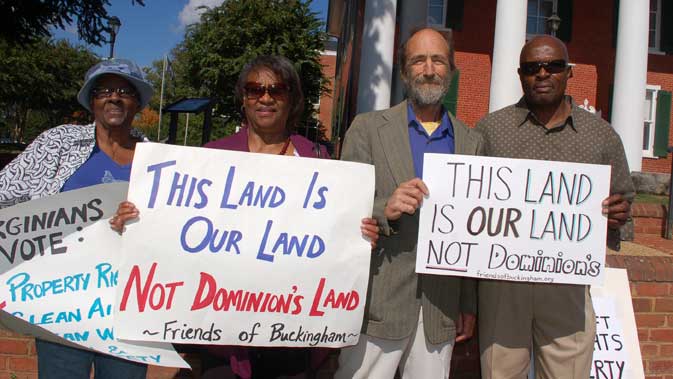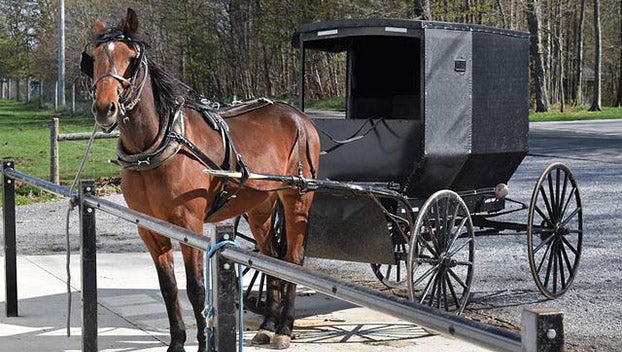Judge hears pipeline suits in circuit court
Published 5:28 pm Thursday, October 15, 2015

- Cora Perkins, Willie Mae Booker, Richard Perkins and Robert “Bob” Day Jr. picket in front of the Buckingham Courthouse in opposition of the proposed Atlantic Coast Pipeline before a court hearing. Both Day and Richard Perkins are being sued by the Atlantic Coast Pipeline, which is seeking to gain access to survey on their property.
Circuit Court Judge Donald C. Blessing heard several civil suits during a hearing Tuesday afternoon filed by Atlantic Coast Pipeline (ACP), LLC as the firm seeks to gain access to properties to conduct surveys for a proposed route.
The hearing included attorneys representing landowners from Cumberland, Buckingham and Prince Edward counties and lawyers representing ACP.
At the end of the hearing, Blessing ruled that the Virginia Code section ACP was suing under to attempt to gain access to the properties is constitutional.
Prior to the hearing, Buckingham landowners and members of Friends of Buckingham gathered outside of the courthouse to picket in opposition to the proposed project, which, if approved by the Federal Energy Regulatory Commission (FERC), would result in a 42-inch natural gas pipeline buried through the three counties.
The hearing focused on a demurrer — or a pleading that objected to the suit filed by the ACP — filed by landowners’ attorneys, which Blessing overruled after hearing from the lawyers, according to the Buckingham Circuit Court Clerk’s Office.
Charles Lollar, of Lollar Law, who represented some Buckingham landowners, said the overruling of the demurrer “simply means that he gave us, at my request, 21 days to respond. So, it’s just as if we didn’t move to dismiss. We’ve just got to go to a full response to the petition. Then the case will just play out from there. He did rule that the statute … was not, in his opinion, unconstitutional either facially or as applied.
Blessing told the small gathering of attorneys and landowners that he would hear suits from all three counties — “the ones that are ripe to be dealt with today.”
A majority of the suits filed by the ACP are in Buckingham County. One suit has been filed in Prince Edward Circuit Court, while another has been filed in Cumberland Circuit Court.
ACP filed the suits under section 56-49.01 of the Code of Virginia, which allows natural gas companies to make examinations, tests, hand auger borings, appraisals and surveys for “its proposed line or location of its works as are necessary … to satisfy any regulatory requirements and … for the selection of the most advantageous location or route. …”
The law also requires natural gas companies to give landowners notice of intent to enter their property.
Attorneys representing the landowners asked that the judge dismiss the suit, saying that the law conflicted with the Virginia Constitution.
“The statute affects my client’s right to [the] fundamental right of private property,” said attorney Stephen Clarke, who represented landowners in Cumberland and Prince Edward.
Isak Howell, representing several Buckingham landowners, said that the ACP didn’t satisfy the requirements of the statute it was suing under and questioned the date the firm told landowners it would perform the surveys.
“We also believe it’s unconstitutional,” Howell said of the law. ”There’s no public purpose here,” he said of the project.
Lollar said there were several problems with the facts alleged by ACP and questioned the extent of the firm’s entry to survey. Lollar said that statute ACP was suing under should be ruled unconstitutional.
Brian Jackson, an attorney with McGuireWoods, who represented the ACP, said he agreed with U.S. District Court Judge Elizabeth K. Dillon’s recent dismissal of two lawsuits from Virginia landowners who claimed the state’s survey permission law violated the U.S. Constitution.
“FERC has given exclusive jurisdiction over who’s going to provide public good,” Jackson said of the ACP’s seeking federal approval of the project.





